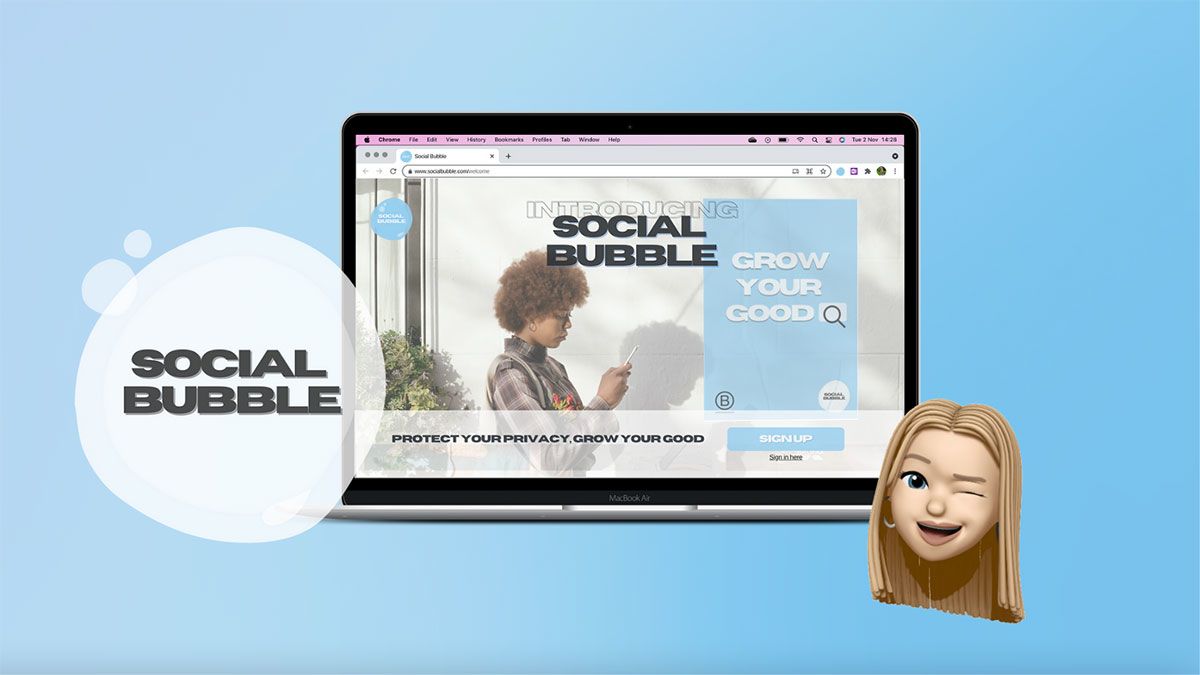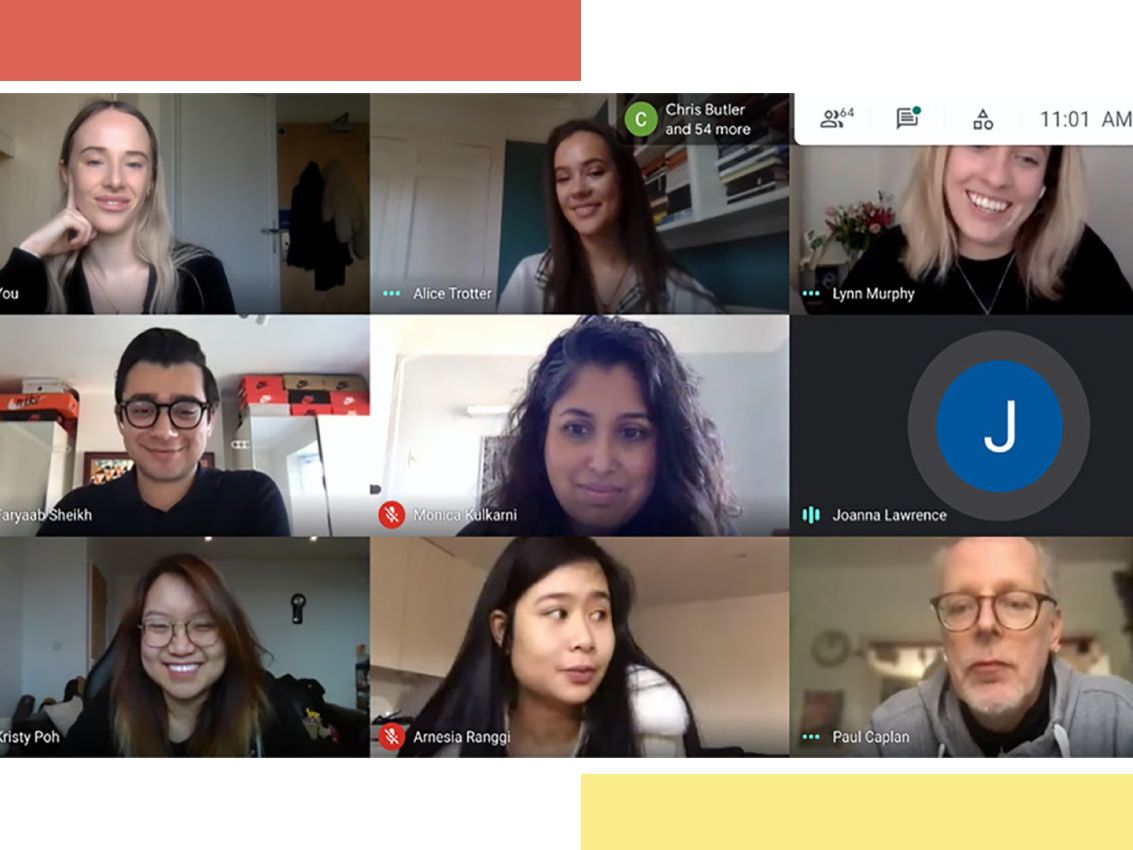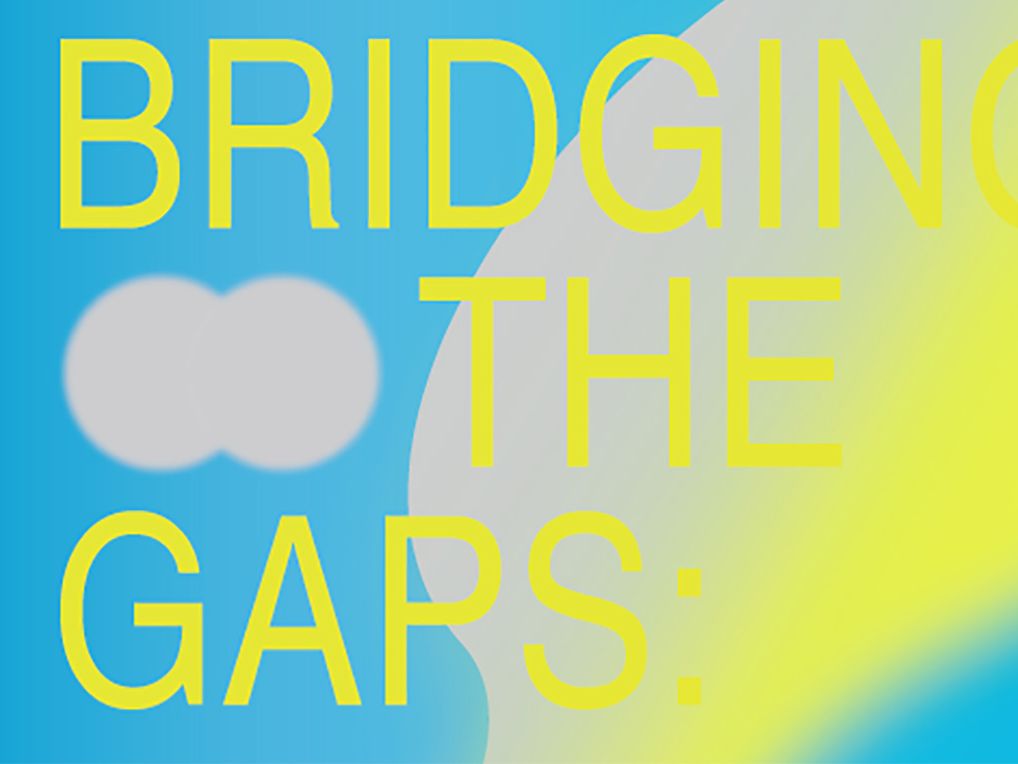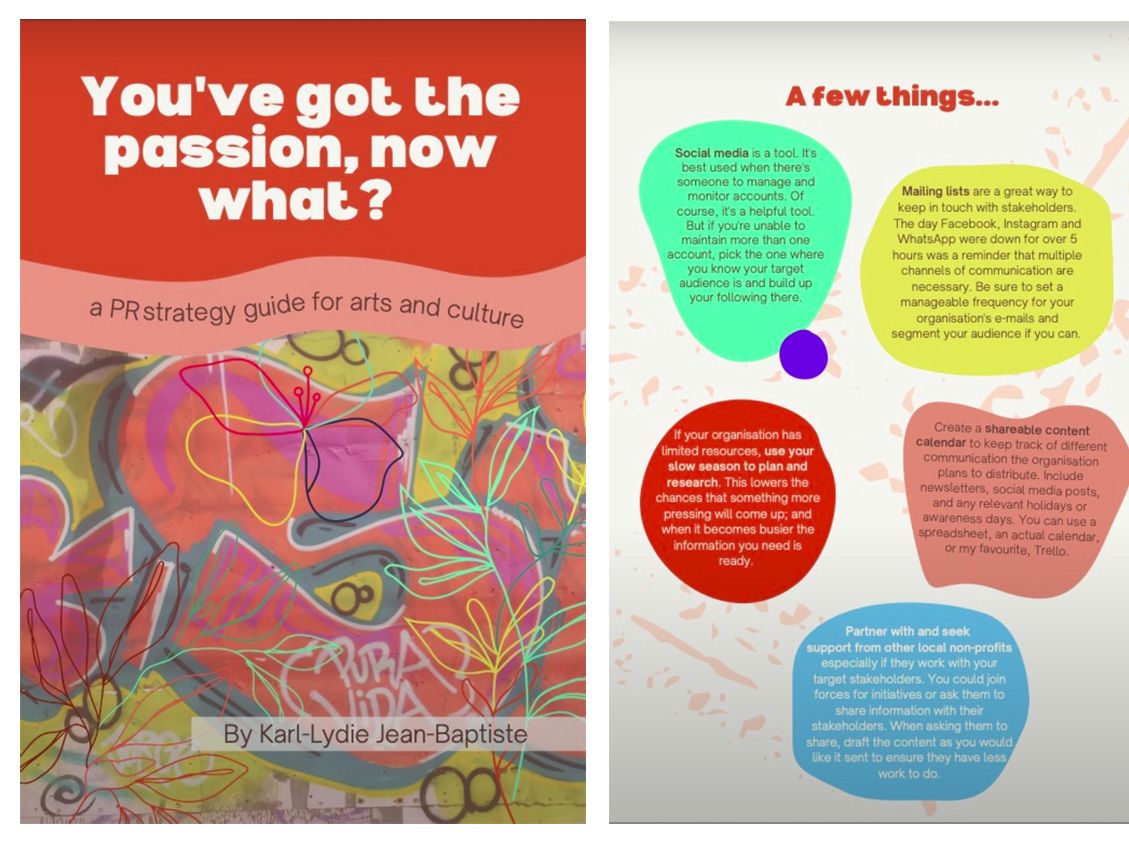
MA Advertising students develop industry insight with Genius Steals

- Written byChloe Murphy
- Published date 26 July 2022

The creative communications industries evolve in ways that respond to the wider social, political and technological shifts around us - generating new conversations and sparking new ideas. At London College of Communication (LCC), we enable our students to explore these changes in real-time by connecting to the expertise of broader industry networks, preparing them to respond to challenges at the cutting-edge of their discipline.
One such opportunity can be found on our MA Advertising course, in which students are given the opportunity to tap into the latest industry trends through a longstanding partnership with global advertising consultancy, Genius Steals. Centred around the Final Major Project unit, founders Rosie and Faris Yakob present summaries of the most common questions they receive from clients, and identify 7-8 key areas that reveal pressing issues within the contemporary advertising landscape.
Supported and supervised by tutors, students are asked to develop an extended response to a research question generated within their selected area of specialism, with options ranging from topics such as gaming and The Metaverse to diversity and fake news. A selection of the most high-performing projects are then sent to Rosie and Faris, who then not only provide insightful industry feedback, but also choose their ‘Best Project of the Year’.
In the most recent cycle, student Connie Lowman was named winner in recognition of her Final Major Project, Social Bubble, which aims to confront the challenges of contemporary cookie collection by offering a more ethical, user-friendly alternative. Developed as a browser add-on, the concept not only aims to protect the data privacy of internet users by managing brand access to their personal details, but also supports them to ‘grow their good’ and their wider digital network.
Both Connie and the creators of an additional 5 outstanding projects – Remix, Kristy Wei Fern Poh; Disability, Lynn Murphy; Fake News, Sandra Södergren; Class and diversity, Monica Kulkarni; and Brands and Bands, Enya Buchenau – were offered the opportunity to edit the Genius Steals’ newsletter, Strands of Genius, connecting them to a mailing list of over 13,000 professionals in ways that not only enhanced their industry networks, but also enabled them to articulate their ideas through evolving platforms and contexts.
“Producing an innovative, authoritative and future-facing report”
Course leader Dr Paul Caplan explained that the annual collaboration provides an opportunity to connect students to vital developments at the forefront of the advertising space.
“Every year we work with Genius Steals who identify the hottest topics and, most importantly, the questions their clients are asking them about. MA Advertising students then take on those challenges with the aim of producing an innovative, authoritative and future-facing report for Rosie and Faris,” he explained.
“Our partnership means the students have an industry-relevant project to discuss at interview, and many students have said that their report for Genius Steals has been crucial in them getting a job.”
We caught up with Connie to discuss the development of her winning concept, Social Bubble, along with her movement from marketing to the advertising field, the importance of applied creativity, and highlights from her time at LCC.
Design Talks: Genius Steals | Webydo
Tell us about your creative practice.
The focus of my research is challenging what we believe to be true in the advertising industry. I’m particularly interested in themes surrounding the ownership of online data used for addressable advertising, as well as the ‘digital dependency’ narrative that we assign to Generation Z.
As I'm just starting out in the field, I think it’s important to bring a fresh approach to existing challenges and opportunities within a specific area of interest. For someone considered part of Gen Z - and especially considering the industry I operate within – I’m pretty unconventional for not having social media, and because I’ve also taken a particular interest in how we as internet users control our data, I think I'd define my specialised focus as a merging of these 2 spaces underlined by purpose.
Thanks to my Final Major Project, Social Bubble, this is also an area in which I’ve been able to secure an exciting job!
How did you first become interested in the world of advertising?
I remember coming across an ad from Patagonia in The New York Times featuring a big, bold headline that read: ‘Don’t Buy This Jacket’. Addressing issues of consumerism and negative environmental impact, the clothing brand had created something that directly opposed what you’d expect from traditional advertising.
I began to take an interest in how big brands and agencies can use the tool of advertising for good, and how my personal views on hyper-consumption and targeted advertising could challenge industry conventions. Making the decision to steer away from a career that involved sales targets and repetitive number crunching to move into an area where I could leverage my sense of purpose suddenly became more appealing.
Overall, I think combining my ethically disruptive strategic thoughts with my creative vision in a fast-paced environment enticed me into the advertising field.

Did you study the subject at undergraduate level, or was this an area you moved towards over time?
For my undergrad degree, I studied BSc Marketing at the University of Kent. While I think this was overall a positive experience, I also felt there was a suppression of creativity where everything seemed to be number-driven and based on theory rather than focusing on the human experience. As a result, I was naturally drawn to the greater creative expression - both strategically and artistically - that an MA in Advertising would allow.
My marketing background gave me a solid understanding of business and entrepreneurial principles that I was able to bring into my Master’s. While there was a slight crossover between the disciplines, both the practicality of MA Advertising and the opportunities to make what you wanted out of a project appealed to me.
Why did you decide to study MA Advertising at LCC?
UAL is renowned for creative innovation, and I wanted to study in a city I knew would inspire my creativity.
London College of Communication offered a course that didn’t simply ask me to write essays and complete little practical work that would actually tie into the career I was looking to pursue. Instead, MA Advertising really offers the opportunity to develop practical skills that enhance your employability - for example, we’ve been fortunate enough to work with big names such as MediaCom, The Telegraph and Oliver Wyman on interesting industry briefs.
I (rightly) believed that Dr Paul Caplan’s course involved the future orientation needed to tackle new challenges and opportunities that the industry is facing with new ideas and approaches. Through a combination of both strategic and creative thinking, MA Advertising has surpassed the industry knowledge and experience I hoped to have gained when I first joined.

Where did you first find out about the opportunity to work with Genius Steals, and why did you decide to get involved?
I was fortunate enough to cross paths with Rosie, Faris and their nomadic creative agency Genius Steals due to their advisory role on my cohort’s Final Major Projects (think ‘creative dissertation’).
At the beginning of our 9-month project, we had a super exciting call with the pair who took us through areas they deemed worth exploring and particularly topical for the year. I felt inspired by a few points that Faris made surrounding the future of addressable advertising as the cookie’s impending extinction looms over brands looking for targeted advertising solutions.
Over the course of the time I spent exploring this topic, I created a speculative start-up called Social Bubble. Originally developed as a website for my FMP, I’m now evolving the concept even further (and perhaps without the speculation). After exploring my work, Rosie and Faris requested that I curate a publication of their weekly newsletter, Strands of Genius, due to their interest in my future-oriented thinking.
Excitingly, the newsletter has made its way into the inboxes of over 13,000 industry thinkers, shining a spotlight on my thinking. Very cool! And Faris supports Social Bubble itself, saying that it 'might even help reinvent digital advertising as we know it’.
What did the brief for your Final Major Project involve, and how did you approach it?
We were given a lot of creative freedom, and encouraged to take our project in any direction that we saw fit within the realm of advertising. Whether we wanted to write a dissertation, create a game, or build a website, this freedom in thinking opened doors to loads of different possibilities, and while daunting, it encouraged independent thought and supported me to find a specialism that I felt truly passionate about.
At the start of the project, I knew that I was interested in the future of addressable advertising, but the research question I began with quickly evolved to a more unrecognisable place – although a place I eventually felt happy with. After a great deal of research, I became pretty well-versed in the red flags with Google’s cookie replacement, which included confusion on the side of brands and advertisers who will have to re-shape their consumer data acquisition, and perspectives of the consumers who are now – more than ever - feeling uncomfortable with signing off their cookies to 100s of different data hoovers a day. As a result, I reached the following question: How can brands build trust with Generation Z while serving personalised ads in a post-cookie and post-privacy world?
Introducing Social Bubble | Connie Lowman
What inspired Social Bubble, and how did you develop your idea further?
Having written my question, I was then able to identify the core themes relating to the research that I’d be conducting which in my scenario were privacy, personalisation and Generation Z. With this in mind, I then went away and did a ton more research on these themes using a broad array of sources.
I definitely took on a ‘trust the process' mentality because it was quite easy to become overwhelmed by the quantity of information and by the pace at which it’s being released, especially in an industry where one piece of news could completely change the direction of the project (which did happen!)
I found my inspiration not in what was being done currently, but instead by speculating around solutions that technically may not yet be possible. I also realised that the easiest way for me to truly understand how brands should approach serving personalised ads in a post-cookie world was to take on the position of a new start-up company.
What were your highlights of the experience?
I think my major highlight was everything coming together at the end! With months and months of research and a few moments of concern that I wouldn’t actually produce a complete piece of work, pressing submit was a super cathartic moment for me.
Along the journey, I really enjoyed interacting with the Gen Z participants that I brought into my workshops: having those moments to share ideas and get them involved in the creative process was fun.
Also, the discovery of Social Bubble as a start-up brand, taking the role of founder, and creating the website as a vehicle for presenting my Final Major Project was unique yet effective. It turned what could have been a 15,000-word thesis into a much more digestible piece of work that I took a lot of pride in formatting and editing to get to a place where it was succinct and could be enjoyed by others. With too many hours to count of effort into the reading, researching and prototyping of the project, my final piece encapsulates all of the high points and challenges I faced over the course of 9 or so months.
Something that I’m now particularly enjoying is that my project actually helped me to secure a very exciting role at Good-Loop, where I’m now working as part of a team that creates effective advertising as a force for good in the world. Developing my ideas for Social Bubble really helped to develop my personal interests and associated skills which – along with lots of hard work - led me to the position I’m really passionate about today.

What have you most enjoyed about being a student at LCC?
My experience was different to what I’d expected, but that teaches me for trusting the world of Covid! With pretty much the entire year spent on Microsoft Teams, I was surprised by the levels of camaraderie and friendship that we were able to form given the circumstances - I possibly spent more hours with my closest colleagues, Alice and Lynn, than anyone else in 2021 without ever seeing them face to face.
Getting inspired by the people around me, coming together on projects, and creating something respected by industry leaders stands out as being particularly enjoyable. It’s not every day that you can say you pitched an idea about sex toys in front of over 50 members of The Telegraph’s client team or helped raise over £7,000 for a social enterprise selling coffee in support of refugee entrepreneurs. The diversity of projects we worked on and the different opportunities we were given made for an unpredictable but super enjoyable year that has pushed my experience in ways that I wouldn’t have anticipated.
What tips would you give to prospective students who may be interested in exploring the world of advertising?
Don’t feel like you have to read a textbook or lots of heavy academic materials to understand the past. Advertising - especially the MA course at LCC - is about the future, so exploring and researching the technologies, industry figures and people that are making waves in areas you feel passionately about is a great place to start.
I see advertising as a tool for problem-solving a lot of the time, and take issue with data extraction that reduces the power of consumers and channels it into the hands of multinationals. If there’s a cause that you feel connected to, think about how you can use your skills to make a difference.
With advertising, every situation is different, and ultimately, it’s about making a difference: whether like Patagonia, to educate your audience about a purpose you feel passionately about, or simply to entertain. Find something you feel passionate about and bring it to your work.
Related links:
- Find out more about the work of Genius Steals.
- Learn more about MA Advertising at London College of Communication.
- Explore the work of our Media School.



